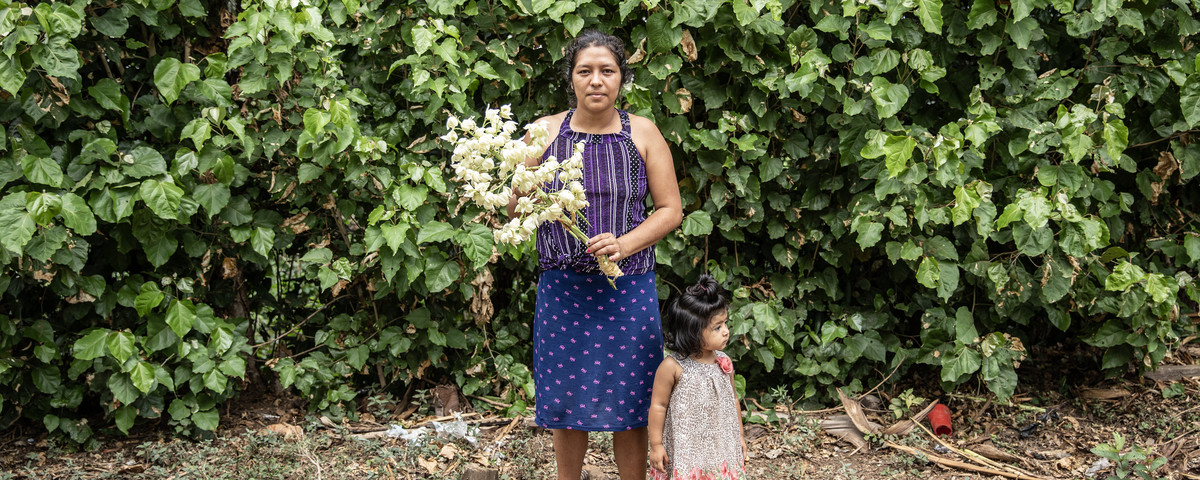Fanny’s Diet: Bananas, Yucca Blossoms, Chipilín Soup
“We almost never have breakfast. We eat two meals a day, at most,” says a 34-year-old mother of three from El Rescate, a remote community in the department of Usulatán, El Salvador.

Fanny Parada spent 2023 unemployed. Her last monthly paycheck was for $96, from a job she had on a coffee plantation, where she worked every day from 7 a.m. to noon for three weeks. In January, she stopped going to work. Fanny is 34 and lives with her daughters, ages 14, 10, and one and a half, in the small community of El Rescate, which like most of the other rural villages in the municipality of Berlín, Usulután, is nestled deep in the forest. The nearest school is a two-hour walk away. Every day, Fanny’s daughters, Kenia, 14, and Nancy, 10, walk up a long and desolate dirt road to get to school on time: they leave before dawn and head home after lunch. It’s either that, or no school.
It’s nearing midday on April 28, 2023. I ask Fanny what she plans to have for lunch. “Fried beans and tortillas,” she says. As for what she had for breakfast, she answers sheepishly: “We almost never have breakfast. We eat two meals a day, at most,”
Fanny is a single mother. She lives between walls of tin and brick, with no electricity or potable water, as is common in many communities in Berlín, where people survive on rainwater. For families like Fanny’s, candles are the only lights at night, and except on rare occasions, they only use one at a time, to save money. Her daughters must take advantage of the daylight to study, otherwise they finish their homework in the dark. They buy what they eat with the proceeds from the crops they sell: corn, beans, or the oranges they harvest in February and November. This is how Fanny makes a living: some months she earns $100, others she manages to bring in $150. This includes the $35 monthly pension that the father of one of her daughters left behind when he passed away a few months ago. With this income, she buys cooking oil, a flat of 30 eggs that will last the family about two weeks, rice, sugar, coffee and milk. “For clothes, we have to figure out what to do,” she says.
Not long ago, her family received a donation from the Asociación de Ayuda Humanitaria Pro-Vida, a Salvadoran nonprofit. The day the assistance arrived, Fanny had no food left in her pantry. The three pounds of rice and sugar, containers of oil, and bags of fortified flour, instant soup, and powdered milk saved her family from starvation. “I’m worried about the little one, she has stomach problems. I have to hustle to always have milk for her,” Fanny says. When the family runs out of food and there’s no more money, they resort to chipilín. They eat the wildcrafted leafy green up to three times a week in soups, along with bananas for breakfast, but only during harvest times; they have eggs and flor de izote, or yucca blossom, for lunch, but only when it’s in season. Nancy and Kenny eat at school, where they are served rice and beans, or a corn-mush beverage called atole.
Four months ago, Fanny’s father sent them some beef stew. This was the last time they ate meat. Before that, Fanny’s daughters had asked her if one day they might be able to eat chicken, so Fanny bought them half a pound, which cost her $2.50. “The girls wanted me to make them carne entomatada, but I only had enough money for the chicken. But they wanted it so badly they didn’t even care that there weren’t any tomatoes,” Fanny says, describing that rare occasion when there was meat on the table.
A lack of work is plunging Fanny and her family into a state of hardship and uncertainty, which gets worse when it doesn’t rain, or when the chickens stop laying eggs, or when their corn and bean reserves dwindle. “There are jobs here, but only for men. It’s all heavy, physical labor,” Fanny says. Sometimes she manages to find work pruning and weeding, and her family is able to eat something other than their usual diet of bananas, chipilín soup, and yucca blossom.
| Reporting: | Julia Gavarrete |
| Photography: | Víctor Peña and Carlos Barrera |
| Translation: | Max Granger |
| Web design: | Daniel Reyes, Daniel Bonilla, and Alex Santos |
| English edition: | Roman Gressier and José Luis Sanz |